Dear community,
Today, we have our final episode in our series on resident well-being, featuring storyteller and emergency medicine resident, Dr Ade Osinubi.
💫 Spread the light with Dr Devika B. First-person accounts of living with mental illness that dispel stigma and stereotypes and instead, spread hope and light — also a YouTube channel and podcast on Apple and Spotify
Because stigma festers in the dark and scatters in the light
This conversation with Dr Osinubi touched on her decision to go public with her journey; navigating and relearning her relationship with her faith; her experiences as a Black woman in medicine; and her mission and convictions as a storyteller.
Dr Ade Osinubi is a resident physician in emergency medicine, a documentary filmmaker, and photographer whose work focuses on telling the untold stories of minority populations. She recently created the documentary Black Motherhood Through the Lens, about four Black women's experiences with reproductive health in the US, recognized in Forbes and PBS. She has written for the Washington Post, Teen Vogue, and Glamour magazine on topics related to health equity. She received the 2022 National Minority Equality Forum 40 Under 40 Leader in Health Award and the 2023 Black Health Connect 40 Under 40 Award. She shared her own mental health journey publicly this year.
Above, you’ll find the audio recording of the podcast episode and below, a transcript. As always, the written conversation has been lightly edited for clarity and length.
If you’d prefer to watch this conversation, click here.
Trigger warning: In this interview, we talk about misogynoir, death by suicide, the toxic conditions in medical training, depression, and anxiety.
Catch other parts of our mini-series on clinician well-being:
Psychiatrist Dr Ahmed Hankir’s journey with melancholia and elation in medicine
Psychiatry resident Dr Jake Goodman’s journey with depression and anxiety in medicine
Nephrology fellow Dr Justin Bullock’s journey with suicidality and depression in medicine
Understand the key issues — Deep dive: Clinician well-being
Click here to catch up on other Spread the light columns, in addition to other posts organized by column type, going back to our newsletter’s launch in January 2023.
If you or a loved one needs help for a mental health crisis, don’t hesitate to call or text 988 — or reach them online here. Find other resources here, search for a US treatment facility here, and find a US-based therapist here.
If you’re a US-based clinician or health student dealing with “any issue, not just a crisis” — reach out to the Physicians Support Line, free of cost and confidentially: 888-409-0141 (M-F, 8 am to 12 am ET).
Wishing you light,
Dr Devika Bhushan
DB: Ade, tell us a little bit about your mental health journey, and what led you to be so public about your experiences.
AO: I think my mental health journey started in high school, but I was truly cognizant of my mental health journey when I turned 25.
In high school, I attended basically an all-White boarding school in New England — very much an elite New England boarding school. That was a very challenging experience for me being one of the few Black women there, you know. I felt very much isolated, alone, kind of alienated.
And I wasn’t really able to put the words to those experiences — experiencing racism, misogynoir especially, which is race-based violence against Black women specifically. So, you know, I knew about those experiences, was not really able to name them.
Going off from there, I went to undergrad at Brown University, had a great experience there overall. There, I was able to really name the experiences that I was going through as a Black woman in the United States.
But then when I turned 25, you know, I think a lot of people can relate to this, you know, quarter century — I had accomplished a lot that I was grateful for, but there were some things that I felt like I hadn’t accomplished yet, especially in terms of my personal life, which was really challenging for me.
And so when I was 25 and feeling, you know, those feelings of anxiety, even depression, that’s when I went out to seek a therapist who I’ve been working with for the past two years, which has been a really great experience. She’s a Black, Nigerian woman. And I was able to really talk about my experiences in boarding school; I was also in a predominantly White private school before going to boarding school — and start to work through those issues.
And I would say some of the experiences I had in medical school and then obviously the residency, you know, made my mental health worse, for sure.
DB: Sounds like finding the words and the right place, the right person with whom to unpack those experiences was really meaningful for your recovery.
AO: Absolutely.
DB: And tell us — especially for those listeners and viewers who have not been to medical school, have not been through residency — what specific factors in medical training really set us up for poorer mental health and what your experience has been in those phases.
AO: Overall, I had a great medical school experience. You know, I was at Brown University, very much a socially conscious environment, but still there were situations that I encountered that weren’t directly related to faculty or peers that were challenging, especially when it came to racial dynamics.
So for example, I was rotating at a outside clinic, and had kind of an unfortunate experience with get being blindsided by negative feedback, which actually caused me to have to remediate the rotation, jeopardizing my application to residency, possibly jeopardiz[ing] me being able to graduate on time.
Luckily, I was able to appeal that decision. But that created a lot of stress and anxiety because I had thought I was doing great during the rotation and then at the end, you know, I was getting all this feedback that was so surprising. And I do feel that there was a component of race to that.
Moving forward after that situation, I had a lot of anxiety about being clinically evaluated by peers or residents or faculty because, you know, you might think you're doing a great job and then at the end, you may get discordant feedback.
I think the structure of hierarchy in the medical system can be very challenging. It can be very bureaucratic, especially as a medical student — you’re at the bottom. And so that can be challenging. That can definitely take a toll on your mental health. You’re trying to do well on clinical rotations: you’re waking up early, you’re seeing patients, but then having to go back to study. That’s one aspect of medical school that can be challenging, let alone the USMLE Board exams, Step I, Step II.
And then moving on to residency: the list is very long, starting from sleep deprivation, challenging patient interactions, challenging patient situations — because again, like, this is your first experience as a true provider — unfortunately, you’ll experience patient death, you’ll experience poor clinical outcomes.
And it’s just unfortunately part of the job.
And then also just like the logistics of being a resident: trying to keep in touch with friends, trying to afford basic things like food, your rent, when a lot of times you're being paid paycheck to paycheck.
DB: Right. In your very powerful series of Tweets on June 30th, one of the things you said was: ‘despite steps being routinely outlined and suggested to improve the lives of trainees and attendings, despite the advocacy efforts of many residents are still severely underpaid and subjected to toxic work environments and unhealthy work hours.’
DB: That whole thread was just incredibly personal and poignant. And I’m curious if you can give us a sense of what led to that moment for you of saying, ‘Enough is enough; I need to speak out and I want to share my truth in this way.’
AO: So in terms of the Tweet that I made on June 30th about my experience with just feeling very overwhelmed, kind of at my breaking point on my surgical ICU rotation, coupled with the unfortunate death of Dr Nikita Mortimer—who I did not know personally, but I had people in my life who did know her personally—I thought it was just really important to vocalize my experience. You know, I’m aware that I do have a platform on Instagram, TikTok, Twitter, and I was afraid that people would look at my page or me and think, 'Oh, she has it all together.’
And no, that is truly not the case. I struggled tremendously during intern year with mental health, with feelings of hopelessness, things of that nature. And I had no choice but to be honest, right? Because at least people knew that they were not alone in their experience.
And after sharing that Tweet, and also prior to sharing that Tweet, I knew a number of residents who were experiencing the same thing, the same feelings of depression, some people going on antidepressants.
And the response was: I think it was encouraging that people felt the same way. That maybe I could have helped someone in a similar situation. My intent was for people to see themselves in any aspects of the Tweet.
It took me almost two months after the situation to talk about it and not because I was ashamed of it. It’s just I really wanted to process what Dr Nikita Mortimer’s death meant to me as a Black woman in residency. And I just wanted to figure out the best way and the most responsible way to address it.
DB: Yeah, that makes a lot of sense. Were you at all apprehensive about potential backlash?
AO: Overall, I really enjoyed my residency program and I’m not just saying this because I’m on your podcast. I guess my apprehension was I didn’t want, you know, the people that I’ve worked with, that I’ve had great experiences with, to feel like I was talking badly about them, right?
Because I do feel like my program has been supportive, but even with the supportive residency program, the structure of residency is just really challenging, right? And like, that’s just kind of how it is.
And so I think that was basically my apprehension. But I’m also someone who doesn’t necessarily care as much of what people think, right? So I was just like, some people might feel a type of way about it. But I wasn’t listing my program specifically. I wasn’t calling anybody out. I was like, ‘Hey, this is a problem, right?’
Like we’ve lost unfortunately, many lives to medical training, let alone, you know attendings, all of that. This is really a matter of life or death, so at the end of the day, I’m speaking from my personal experience and whoever wants to react in a certain way can. And I’m glad that I was honest. When I was younger, I was very much worried about what people thought; I was very quiet. But I think the best experiences I’ve had to date have come from me being honest.
DB: Amen — to being honest and speaking truth to power by really just discovering who you are and being that person authentically… You said it took you about two months or so to process what had happened and come to a place where you were able to give voice to it. And I’m curious if you can help us sort of understand how you picked yourself up from that place that you were in, in the surgical ICU and got to a place where you were feeling whole and healthy again.
AO: Well, I’d say I’m still in a process of recovery, right? I wouldn’t say I feel 100% back to where I was, to be honest. And I think like that is just like the mental health journey, right? Mental health has multiple ebbs and flows, and that’s just kind of like where I'm at right now.
In the surgical ICU, after that happened, I was not able to pick myself up. I just wasn’t. I had no more strength or not much else to give.
And the people who picked me up were my parents, at the end of the day. And I’m lucky enough to have had that support system. A lot of people don’t necessarily have that.
I still think like residency is really challenging. Burnout is very real. I wish I had a prettier package to give you — I’m still struggling, to be honest with you.
DB: It’s real. And I appreciate it. [We are both so lucky to have parents like we do.] You know, some of my most dark mental health moments were also in residency and in medical school. And since leaving home at 18, I’ve always been oceans apart from my own family and my parents, you know, they were in the Philippines initially, and then now live in India. But when I was in crisis, one of them would get on a flight and they would just be with me for the weeks that it would take sometimes to re-stabilize. And I completely empathize with that statement that you made that it is a journey and there’s so many layers to it and it takes a long time sometimes to feel like we're 100% back.
I’m sorry to hear that you’re not quite there yet. My heart goes out to you because I know how hard that place can be.
…As you look back at kind of that worst moment in your own mental health journey: is there a piece of advice or something that you would want to say to that person in that moment?
AO: I would say: ‘There are things to look forward to,’ Like not necessarily, ‘Oh, it gets better, but there are things that you can look forward to.’
DB: I love that. And as you’re thinking about the totality of your journey, how do you feel like stigma has intersected with your mental health?
That's a good question. So for me, I grew up as the child of Nigerian immigrants. We did talk about mental health, for sure. But like, I grew up in the church; luckily the church that I went to did talk about mental health, too, but in some ways you kind of internalize those messagings, like, you know, ‘if you just pray about it;’ ‘if you just do x, y, z thing, you’ll get out of depression’ which doesn’t always work for people.
But, you know, my Mom is a physician at the end of the day, so she recognizes that some people need to be on medications, some people need therapy, all of those things. But I still think in some ways, I probably internalize some messaging from the church about mental health.
DB: And how did you get to a place where you were able to let go of some of those beliefs or even self-stigma around those beliefs?
AO: I think it was a super gradual process because for me. I wasn’t necessarily aware that those stigmas existed in the church, but in terms of my own personal experience, I wasn’t sitting here being like, ‘Oh, like I'm aware of how growing up in the church has affected me addressing my mental health.’
It was very subtle because I grew up in a healthy church environment, grew up in a healthy home, but I still think that the messaging is subtle. And so I think over the past two years, especially since my therapist is actually Christian — asking the tough questions, having those conversations — I do think part of my mental health journey has been navigating my faith as well.
I think those barriers kind of came down a bit, but I still think socialization is tough. I mean, I’m 27 — 27 years of being socialized. It takes a lot of undoing. It takes a lot of work.
DB: Yeah, absolutely. And for all of us, it’s a lifelong journey. I’m 37, right? And sometimes I’ll catch myself in moments, falling back on an old belief that is as core to my identity as, you know, my nationality, right? Yeah, unpacking and then relearning those core beliefs — it takes a lifetime of work, really.
As you’re thinking about mental health in general or for yourself, is there a specific myth that you think is out there that you'd like to bust?
AO: I wouldn’t say that this is a myth per se. But I think this is kind of an approach to mental health, especially like in Christian communities — not coming for anyone — but that kind of bothers me a bit.
It's just this idea of toxic positivity: like, ‘it always gets better’ and all of that. Luckily, like, no one has really said that to me as I've been struggling over the past couple years. But on Instagram, you’ll see those little squares and there’ll be a quote: like, ‘one day it’ll all make sense.’
I have a personal problem with those because at the end of the day, some things don’t make sense. We’re not, in my opinion, put on this earth to be all-knowing. Sometimes it just actually doesn’t get better in certain ways. Or it may improve in ways that you don’t expect, right? Or better may look different than you expected.
DB: For sure; there’s a lot of toxic positivity out there. And like you said, some things just aren’t meant to happen and they aren’t for the best. Thank you for calling that out.
You’ve talked about your relationship with your parents and renegotiating your relationship with your faith and about your therapist being this really prominent person for you for the last two years: Are there other tools that you call upon to feel stable or to feel better?
AO: Still honestly working on that, to be honest. I think before, one of my ways to get away from how I’m feeling was to wrap myself up in being productive.
It’s nice to be productive, but it’s not great when you’re doing it as a coping method. So I think right now, I’m trying to better listen to what I want, what my body needs.
Maybe today I’m not working on this extracurricular activity. Maybe I’m just sitting and watching TV.
I do think exercise is great, but as a Black woman with changing my hair regularly, exercise really can mess up my hair. And so I haven’t really been exercising over the past couple of months, but when I was, I do feel like it made an impact on my mental health in a positive way.
I think healthy eating is key, something that I’m still working with. Very much a work in progress, but trying to make these large changes as a resident is just hard, to be honest.
You know, I wish I could tell you, I have a morning routine. There’s no way I could have a morning routine as an [emergency medicine] resident because some days, I’m working at 6 am to 2 pm; some days I’m working at midnight. It would be nice, though. I’m sure it would really improve my mental health. I just don't have one. So there’s definitely things that over time, I hope to adopt and improve, but day to day, it’s just honestly survival mode.
DB: That is 100% fair, especially given that you're a second-year resident, and there’s so little control that you have over your life at this moment. And there’s so much wisdom in what you very poetically just did share: that conviction of disassociating your sense of self-worth from what you do or do not do, your sense of productivity and knowing that you are valid and worthy and enough just as you are… That’s beautiful that you’re able to make mental and emotional space for growth in that way right now.
Thinking about physician mental health and resident mental health in particular, are there any other recommendations or insights that you have in that space that you might want to leave our viewers with?
AO: Recognizing how one’s identity, in terms of racial identity, sexual orientation, gender identity, impacts how you experience residency at the end of the day. As a Black woman, my experience is going to be different than a White woman. It’s going to be different than a Black man because of misogynoir or because of my intersecting identities as a woman and as a Black person. I’m not sitting here saying my experience is worse or better. It’s just a very specific experience.
One of my Associate Program Directors, she’s also a woman of color. You know, we talk about these things all the time. She does not necessarily share the same identities as me, but she’s able to be a listening ear and be like, ‘Yeah, this is happening. You are not making this up.’ It has been really helpful.
It’s important to have general policies to improve residents’ mental health and wellness: better pay, better hours, better resources, I mean, the list goes on. But also understanding that residency can be a very specific experience for different people: [having a] partner versus not, or you have kids versus not, right?
DB: As you’re looking back at your 27 years, what are you most proud of in your life?
AO: So far, I am most proud of my health advocacy work. And using documentary film or writing as a way to raise awareness and work to address health disparities, especially impacting women of color, through my two documentaries, through the articles I’ve written about like early puberty, race-based guidelines.
As I told you earlier, growing up, I was very timid, very shy. Part of me would be — well, all of me would be very proud of the work that I have done in that area and being just a bit more unapologetic than I was before.
DB: That’s awesome. Looking back at the film that you made, Black Motherhood Through the Lens, I’m curious to know whether there's a key moment or a key story that stands out that you might want to share with our viewers to help pique their interest and help them get their hands on a copy of the film.
AO: So one of the women, Jamie Potter Rutledge, she is a Mom of two. She’s a Black woman. She experienced postpartum depression and anxiety after the birth of her first child. So she actually went on medication; she did a partial-day program, as well.
And she talks about the stigma she felt going through this experience. She actually hid her medication from family. Then it was only until she was a bit more open about the experience she had where she learned about other people in her circle who have the same experience.
[Post-partum] depression statistically impacts 1 in 7 women-identifying folk, but I’m pretty sure that number is actually larger. She also talks about the steps she took in her second birth, during COVID, in 2020, to try to prevent postpartum depression from happening again.
And she talks about how the isolation of COVID can worsen postpartum mood disorders because you’re not necessarily having family stop by. But for her, luckily, the postpartum experience was a lot better because she was cognizant. She did things like having a doula; people knew the warning signs — [whereas] before she was more so caught off-guard.
DB: It sounds like a really powerful story and a really powerful documentary. Really can’t wait to see the film, everything that comes out of it.
AO: Thank you. I’m hoping for a premiere in April [2024] and finally getting it out to the public.
DB: This is our last question; it’s a big one: What are your hopes for our collective future?
AO: I just want our collective future to continue to be kinder, to continue to be accepting, to continue to be understanding, and to continue to be empathetic. I think our collective whole has those qualities already.
With just the hot mess that the world currently is, continuing to think about those principles, especially empathy, I think is really important. Everything else really falls into place once you just have those those characteristics.





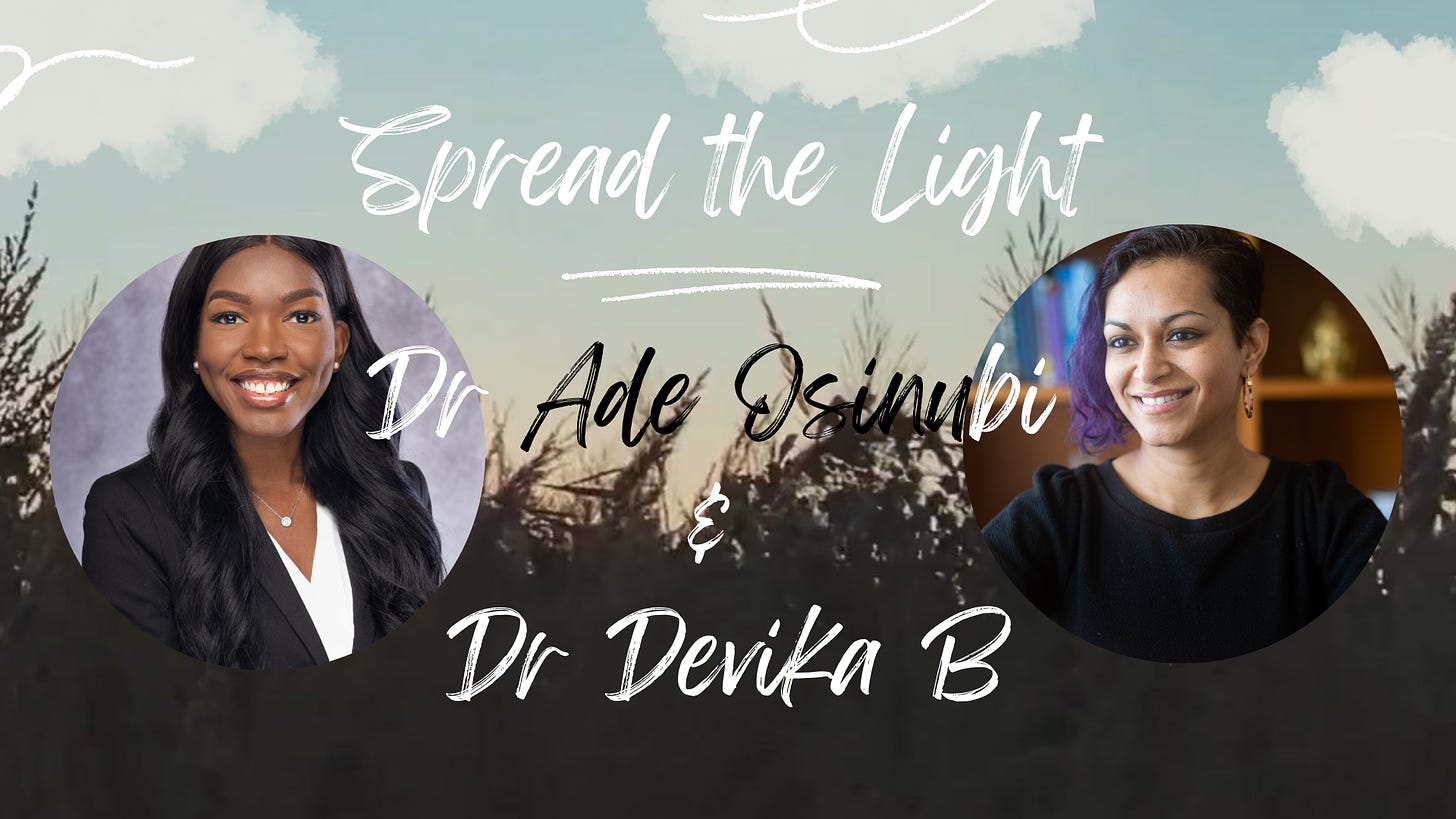


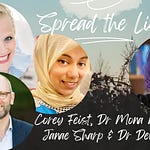
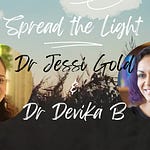

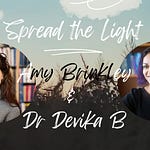
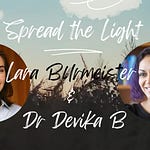
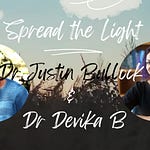
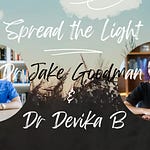
Spread the light: Dr Ade Osinubi's journey with hopelessness in medicine